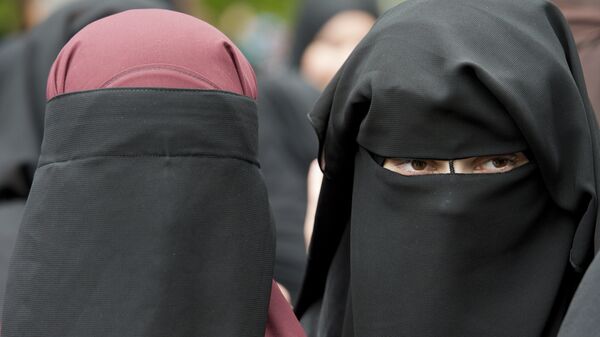In the wake of the deadly terrorist bombings in Sri Lanka, a Sri Lankan United National Party MP has declared on Facebook that he was going to present a private member's bill calling for the burqa to be banned throughout the country.
In the motion he submitted to parliament, Prof. Ashu Marasinghe said the face-covering burka is not traditional Muslim attire and is used around the world by men to hide behind and carry out acts of terrorism.
A large number of women attackers were involved in Sri Lanka attacks who escaped by wearing Burqa. Sri Lankan MP moves bill to ban hizab and burqa. Even the country's muslim leaders say burqa not essential to their culture. Good move 👍 https://t.co/RCfaZ8tyUZ
— Monica (@TrulyMonica) April 24, 2019
"Our Muslim leaders have also accepted that Burka is not traditional Muslim attire and some places even have notices [requiring visitors] to remove the Burka before entering," he said in his motion.
GOOD NEWS. Sri Lankan MP calls for burqa ban to prevent terrorists using face-covering garment to cover up their identity. https://t.co/0rv0wiWZEX #SriLanka #SriLankaTerrorAttacks #SriLankaAttacks #bantheburka #burkaban #auspol #thedrum #qanda #abc730 #sbs #vicpol #nswpol
— Mark Knight (@markknight8994) April 24, 2019
"Accordingly, considering the national security I propose to ban the burka," he said.
READ MORE: FBI to Assist Sri Lanka in Blast Probe — US Embassy in Colombo
France was the first European country to ban the burqa in public, in 2004, with a clampdown on students in state-run schools displaying any religious symbols.
Then in April 2011, the government brought in a total public ban on full-face veils, with then-President Nicolas Sarkozy saying they were “not welcome” in France.
Belgium followed closely in France’s footsteps, introducing its ban on full-face veils in 2011.
Full or partial bans have since been passed in Austria, Bulgaria and the southern German state of Bavaria.
READ MORE: WATCH Sri Lanka Suicide Attack Suspect Patting Little Girl’s Head Before Blast
On Easter Sunday, over 300 people were killed, including at least 45 children, when seven suicide bombers attacked three luxury hotels and three churches.
Sri Lanka's Daily Mirror learned from Defence sources that the perpetrators' female accomplices had escaped from a Dematagoda apartment complex wearing burqas.
Officers were questioning a suspect in the building hours after the initial attacks when they set off a suicide bomb, killing three police officers. Three suspects were detained there.
Sri Lankan Defence Minister Ruwan Wijewardene said on Wednesday that two different local Islamist groups were to blame for the coordinated blasts, but Prime Minister Ranil Wickremesinghe admitted there may be some links with Daesh*.
Wijewardene also told parliament that preliminary investigations suggested the coordinated blasts were 'in retaliation for the attack against Muslims in Christchurch'.
READ MORE: Sri Lankan Bombings Death Toll Rises to 359, New Suspects Arrested — Report
Prof. Ashu Marasinghe 's call for a ban on the face-covering garments comes as Sri Lanka's prime minister warned there are more explosives and militants 'out there', according to Reuters.
Appearing at a Wednesday news conference, PM Ranil Wickremesinghe deplored the security lapses made evident by the attack. He added that some officials would be losing their jobs in light of security agencies having failed to act on detailed warnings before the attacks.
The number of people killed in the deadly Sunday blasts has risen to 359, Ada Derana news portal reported on Wednesday, citing police.
Daesh* has reportedly claimed responsibility for the Sri Lanka attacks and released images that purportedly show the attackers.
*Daesh (ISIS/ISIL/Islamic State), a terrorist group outlawed in Russia and numerous other countries


